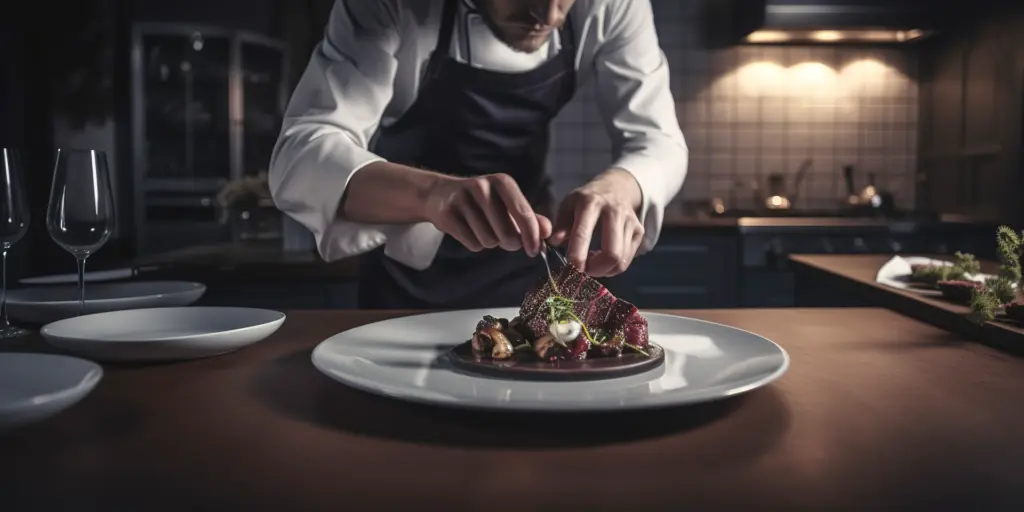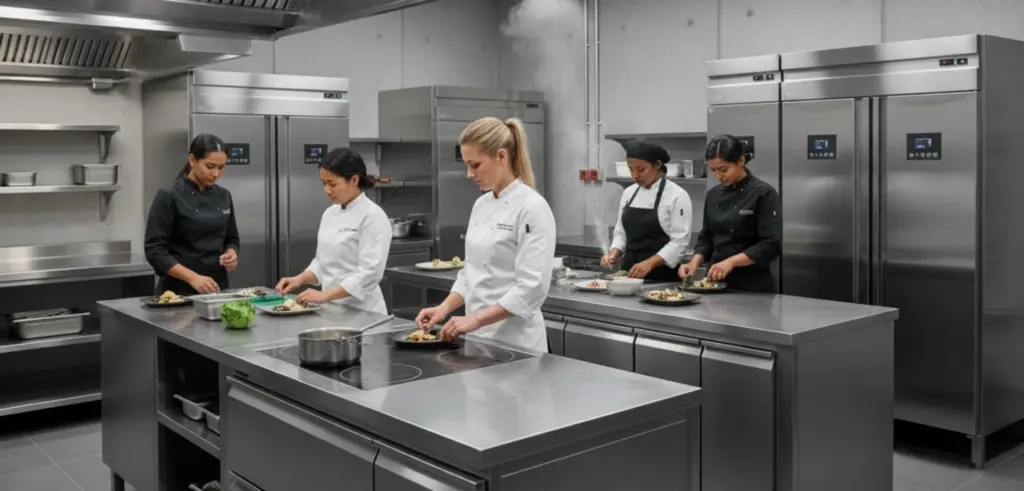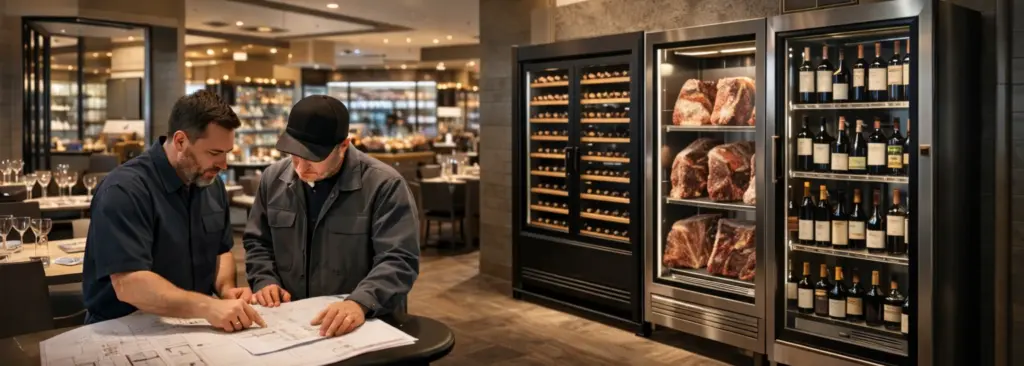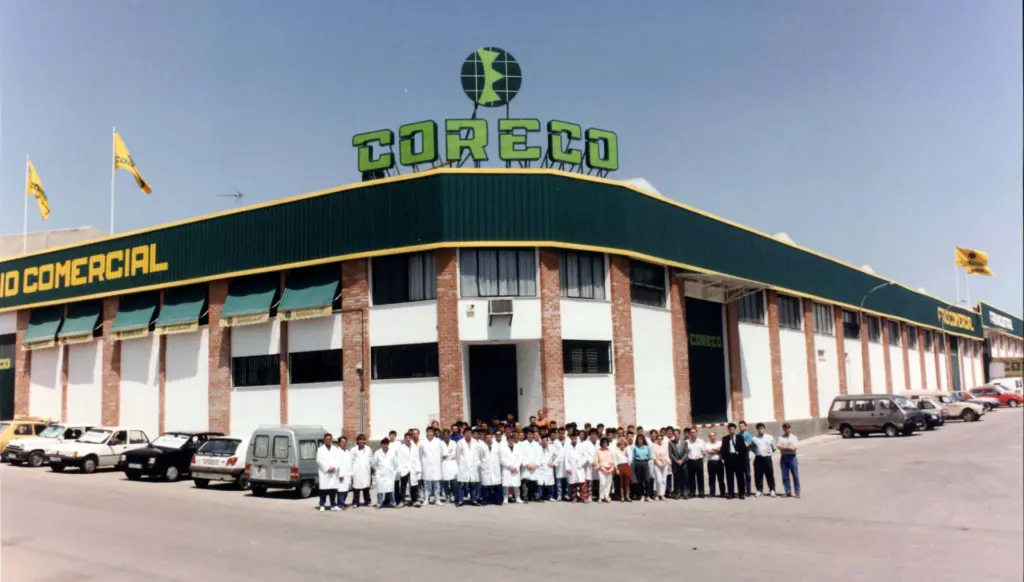Welcome to the blog of Coreco Gourmetwhere we give our view on how technological innovation can transform the professional kitchen. Today we return to the temperature controllersThe new equipment is key to sustainability in the kitchens of restaurants, hotels and other establishments in the HORECA sector, such as central kitchens.
While primarily recognised for their ability to cool food quickly, blast chillers also play a crucial role in reducing food waste, saving energy and improving operational efficiency. Throughout this article, we will examine in detail how they not only optimise cooking processes, but also contribute significantly to sustainability.
Temperature and sustainability converter
1. What is a blast chiller and what is its function in the professional kitchen?
Before delving into the relationship between blast chillers and sustainability, it is important to understand what they are and how they work. A temperature controller is kitchen equipment designed to rapidly reduce the temperature of freshly cooked food, bringing it from a hot temperature (usually above 65 °C) to a temperature safe for cold storage in a short period of time.
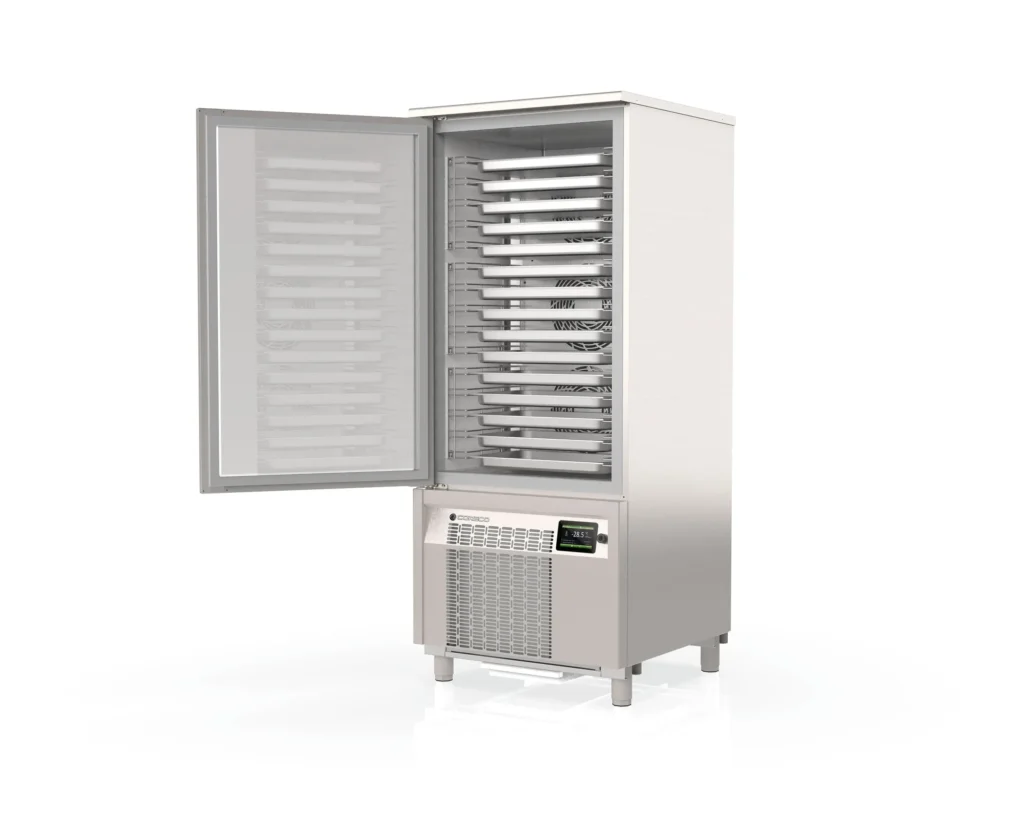
There are two main types of abatement:
- Positive depletion: Chills food down to 3°C in a very short period of time, allowing products to be preserved without the risk of bacterial proliferation.
- Negative abatement or quick freezing: It brings the food to the -18°CThis allows frozen food to be preserved for much longer without loss of quality.
The use of a blast chiller is essential in professional kitchens to ensure food safety and improve food management. However, in addition to these immediate benefits, blast chillers play an essential role in promoting true sustainable practices within professional kitchens of all sizes.
2. Reducing food waste: A key step towards sustainability
One of the greatest challenges facing the food industry is the reducing food waste. According to the Food and Agriculture Organisation of the United Nations (FAO), approximately 30% of food produced globally are wasted every year. This not only represents an economic loss for restaurants and other HORECA establishments, but also has a significant environmental impact due to the use of resources such as water, energy and land in the production of this food.
The temperature controllers help to reduce food waste by allowing for a more efficient use of food better management of leftovers and advance preparations. Instead of discarding large quantities of unserved food at the end of a shift, chefs can quickly break down cooked food, preserving it in perfect condition for later use without compromising its quality.
How they do it:
- Quick and safe lowering: Food that is cooled quickly after cooking is less likely to spoil due to bacterial growth. This allows preparations to be reused on subsequent days without food safety risks.
- Efficient freezing without loss of quality: Blast chillers allow food to freeze quickly, avoiding the formation of large ice crystals that can damage the cellular structure of the ingredients. In this way, food will retain its original texture and flavour when thawed, making it easy to reuse without losing quality.
- Optimisation of ingredient use: Chefs can prepare large batches of food at off-peak times, break it down and store it for use at peak times. This reduces the need to overcook during busy shifts and consequently reduces waste.
Do you want to reduce waste in your kitchen and improve sustainability?
Get to know our blast chillers designed for professionals.
3. Energy efficiency: Temperature controllers and energy savings
Another important aspect of sustainability is the energy efficiency. Professional kitchens are known to be high energy consumers due to the amount of equipment operating simultaneously (ovens, hobs, refrigerators, etc.). The temperature controllers modern appliances are designed to operate efficiently, contributing to a reduction in energy consumption in the long term.
How they contribute to energy efficiency:
- Faster processes, lower consumption: Blast chillers cool food in a much shorter time than conventional refrigerators. This not only ensures food safety, but also reduces the time refrigeration equipment is in operation. Less cooling time means less energy use.
- Optimisation of loads and operating times: Many blast chillers have automatic modes that adjust power according to the food load, using energy more efficiently. This ensures that the blast chiller operates at full capacity only when it is needed, and in low power mode during times when it is not being used at full capacity.
- Prevention of excessive use of conventional refrigerators: By using a blast chiller to rapidly cool food before storage, conventional refrigerators are prevented from overloading, which in turn reduces their energy consumption and prolongs their lifespan.
4. Improved planning and operational efficiency in the kitchen.
The temperature controllers not only contribute to sustainability through waste reduction and energy savings, but also improve the operational efficiency in the professional kitchen, which is key to a more sustainable operation. The ability to rapidly cool food allows chefs and cooks to prepare large quantities of food in advance, optimising the use of resources and time.
Planning and efficiency benefits:
- Advance food preparation: Chefs can plan food production days in advance, preparing large quantities of ingredients or dishes that can be batched and stored for use at times of peak demand. This not only saves time during busy shifts, but also reduces the need for overcooking, thus optimising the use of energy and resources.
- Reduction of operating costs: By improving efficiency in the kitchen and minimising food waste, blast chillers help reduce overall operating costs. The ability to store and reuse previously cooked food also means a reduction in the need to purchase new ingredients so frequently, which is especially valuable in kitchens with tight profit margins.
- Constant freshness and quality: The ability to keep food in optimum condition through the use of blast chillers ensures that customers receive fresh, high quality products at all times. By maintaining control over the storage process, restaurants can offer the highest quality dishes without the need for food waste.
Would you like to improve the operational efficiency of your kitchen?
Find out how blast chillers can help you plan more sustainably.
5. Environmental impact: Reducing the carbon footprint of the professional kitchen
The reduction of the carbon footprint is one of the key objectives of any sustainability strategy. In a professional kitchen, this environmental impact can be directly related to food waste, excessive energy consumption and lack of efficient planning. The temperature controllers address these problems from different angles, reducing the amount of waste generated and optimising energy consumption, which in turn contributes to lower greenhouse gas emissions.
How blast chillers reduce carbon footprint:
- Reduction of food waste: As we have seen, renderers allow for better food preservation, reducing the amount of waste that ends up in landfills. Decomposing food in these landfills is a significant source of methane emissions, a potent greenhouse gas. Reducing food waste through efficient preservation is a direct way to reduce this impact.
- Energy saving: Modern blast chillers are designed to be more energy efficient, which means that they consume less electricity compared to conventional cooling methods. By using less energy, professional kitchens reduce their dependence on non-renewable energy sources and therefore their environmental impact.
- Reduced need for transport of fresh food: By allowing food to be properly preserved for longer, blast chillers reduce the need for constant transport of new fresh produce. This helps to reduce the emissions associated with transporting food, which in turn reduces the restaurant's overall carbon footprint.
6. Examples of sustainability in professional kitchens using blast chillers
Many restaurants and professional kitchens are already adopting more sustainable practices through the use of temperature controllers. A clear example is high-end restaurants that, in order to always offer fresh products and minimise waste, use blast chillers to preserve large batches of pre-prepared food. This allows them to maintain product quality, reduce food waste and make full use of the ingredients.
Another notable example is that of hotel kitchens that cater to large volumes of banqueting and event guests. These kitchens often face the challenge of preparing huge quantities of food without sacrificing quality or food safety. The temperature controllers allow them to cool food safely and quickly, store it and reuse it at later events, significantly reducing waste and optimising the use of resources.
Chillers are essential for sustainability
Undoubtedly these appliances are an essential tool in any professional kitchen looking to improve sustainability. From reducing food waste to improving energy and operational efficiency, they enable chefs and kitchen managers to adopt more environmentally responsible practices without compromising on service quality.
If you're looking for ways to make your kitchen more sustainable, the Coreco Gourmet temperature blast chillers can help you achieve this. Thank you for joining us on this journey through the sustainable benefits of chiller. If you would like more information or are interested in purchasing one of these devices, please do not hesitate to contact us at contact us at.

